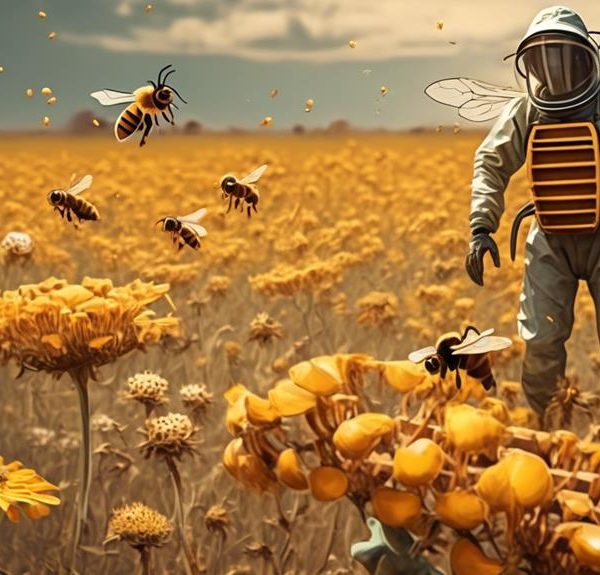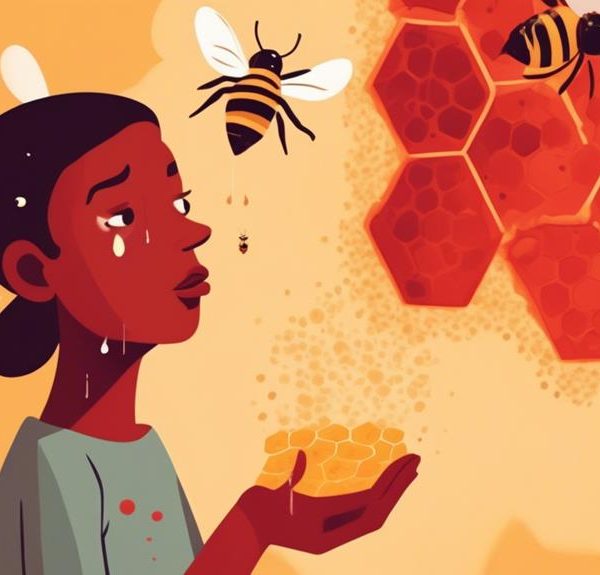Journey into the intriguing world of venomous stings to uncover why wasps may trigger allergic reactions while bees don't.

Why Am I Alergic to Wasps but Not Bees
Imagine you're enjoying a sunny day in the park when suddenly, you're stung by a wasp. You've been stung by bees before with only minor irritation, but this time, your skin balloons up with inflammation and you're hit with an intense wave of discomfort.
It's a perplexing situation – aren't wasp and bee stings virtually the same? You might be surprised to learn that the answer is a resounding 'no'. The venom in wasps and bees, though similar, have key differences that can trigger varying immune responses in individuals.
But why might you react so severely to one and not the other? The answer touches upon a fascinating interplay of biology, chemistry, and individual immunity.
Key Takeaways
- Wasp venom contains more allergenic proteins and can trigger stronger immune responses compared to bee venom.
- Bee venom has more anti-inflammatory peptides and often causes less severe reactions.
- Wasp venom contains enzymes like hyaluronidase and phospholipase, while bee venom is primarily composed of proteins and peptides such as melittin and phospholipase A2.
- Individual variations in allergic reactions to wasp venom can occur due to genetic predisposition, previous exposure, and immune system sensitivities.
Understanding Allergies and Immune Responses
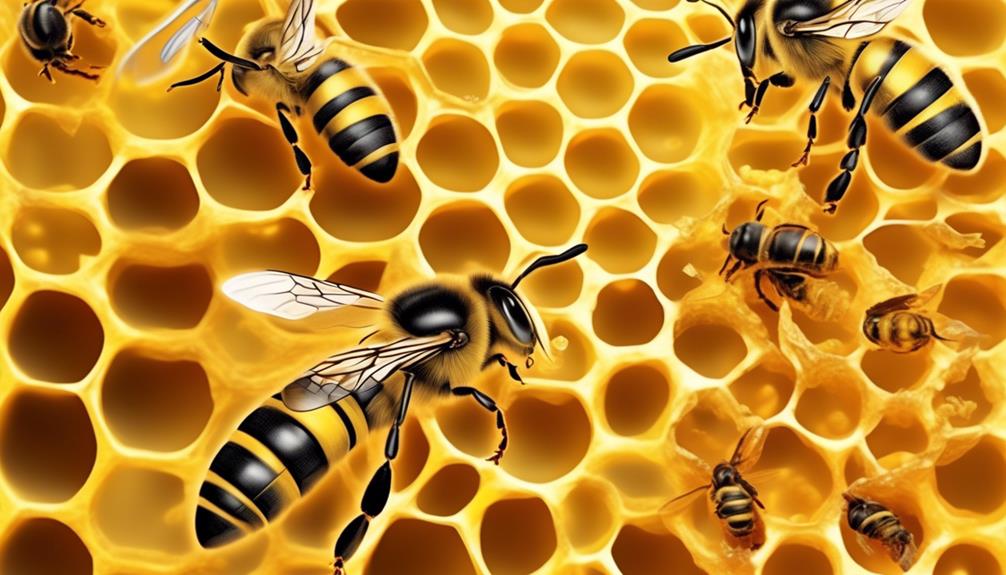
To understand why you might be allergic to wasps but not bees, it's crucial to delve into how allergies and immune responses function in our bodies. Allergies are your immune system's exaggerated response to substances that it perceives as threats. Your immune system initially identifies these substances, known as allergens, during an exposure event.
During this encounter, your body produces antibodies specific to the allergen. However, instead of destroying the allergen, these antibodies trigger the release of chemicals like histamine, which cause allergic symptoms. This process is called sensitization and it's often unnoticed because it doesn't cause noticeable symptoms.
Now, when it comes to wasp and bee allergies, the venom of these insects is the allergen. Although their venoms share some similarities, they also have unique components. Hence, your immune system can recognize and respond to them differently. That's why you can be allergic to wasp venom but not bee venom. It's all about how your immune system has been sensitized to a specific allergen.
The Biological Differences Between Wasps and Bees
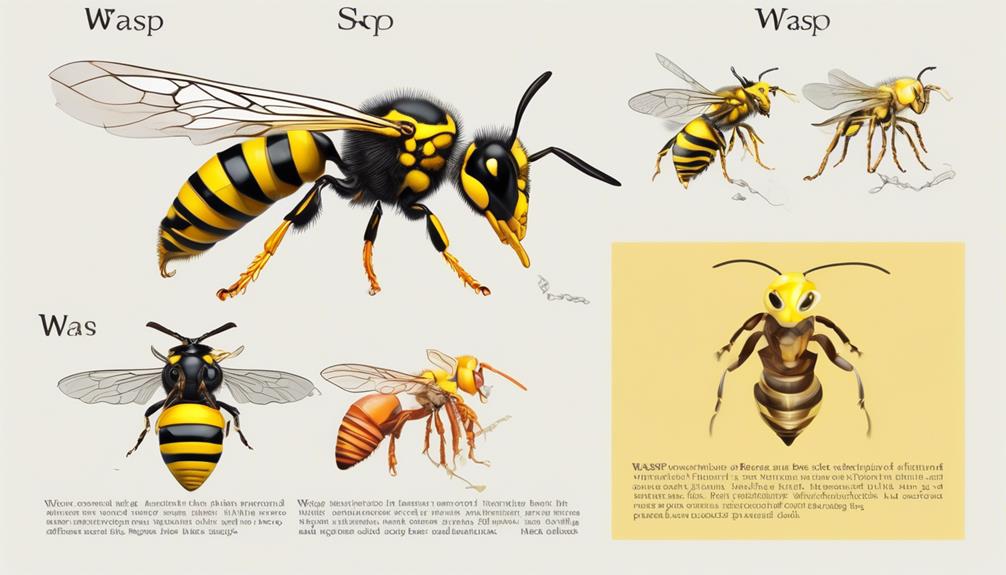
While your immune system's unique response to wasp and bee venom explains why you might be allergic to one and not the other, the underlying factors lie in the biological differences between these two insects.
Wasps and bees are from the same family, Hymenoptera, but their physical features and behaviors diverge significantly. Wasps have slender bodies with a narrow waist, while bees have a more rounded form. Also, wasps can sting repeatedly, injecting more venom into the victim, whereas most bees can sting only once.
Venom composition is the main factor in potential allergic reactions. Wasp venom contains more allergenic proteins which can trigger a stronger immune response, leading to severe allergic reactions in some individuals. Bee venom, on the other hand, has more anti-inflammatory peptides, often causing less severe reactions.
Another key difference is their diet. Bees feed on nectar and pollen, which influences the composition of their venom. Wasps, however, are predators and scavengers. They feed on other insects and human food waste, leading to the production of different venom proteins.
Understanding these differences can help you manage your allergies more efficiently. It's essential to know which insect you're allergic to, as treatments can vary accordingly.
Wasp Venom: Composition and Effects
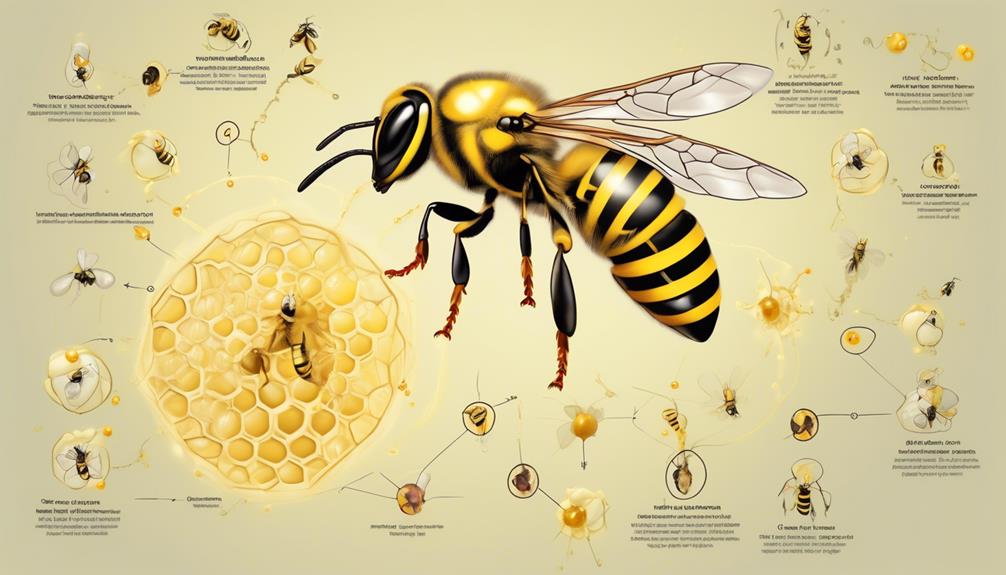
Diving into the world of wasp venom, it's crucial to understand its unique composition and the effects it can have on your body. Wasp venom is a complex cocktail of proteins and peptides, including enzymes like hyaluronidase and phospholipase. These enzymes break down cell membranes and spread the venom throughout your body.
One of the most potent components of wasp venom is the peptide kinin. It's responsible for the burning pain you feel during a sting. Other substances in the venom cause inflammation, redness, and swelling.
If you're allergic to wasp venom, your immune system overreacts to these substances. It produces antibodies called Immunoglobulin E (IgE) that trigger an allergic response, which can range from mild symptoms like itching and hives to severe anaphylaxis, a life-threatening reaction that requires immediate medical attention.
Your allergy to wasp venom doesn't mean you're allergic to bee venom. Although they share some components, the proportions and specific proteins differ, potentially explaining your unique reaction.
Understanding the nature of wasp venom and its effects on your body can help you manage your allergy better and take appropriate steps when stung. Stay informed, stay safe.
Bee Venom: Composition and Effects
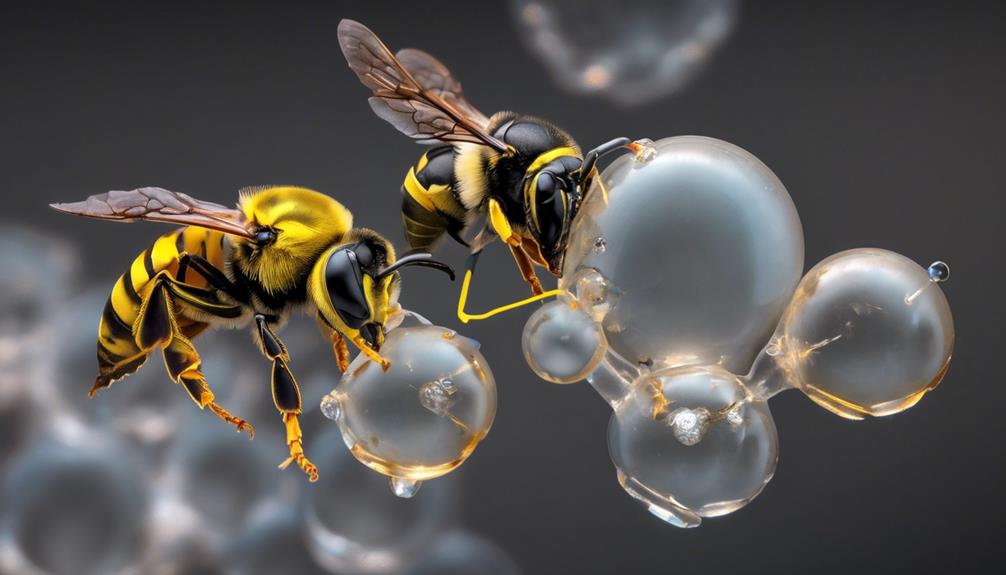
Just as wasp venom has a unique composition and effects, so does bee venom, exhibiting a distinct set of proteins and reactions in the human body. Bee venom is primarily composed of proteins, peptides, and enzymes such as melittin, phospholipase A2, hyaluronidase, and apamin. Each plays a key role in the venom's impact on your body.
Melittin, the most abundant and potent toxin in bee venom, damages cell membranes and stimulates the release of pain-inducing agents. In contrast, phospholipase A2 can disrupt cell membranes and cause inflammation. Hyaluronidase, often termed the 'spreading factor,' facilitates the dispersion of venom by breaking down connective tissue. Apamin, a neurotoxin, can affect nerve signal transmission.
Should a bee sting you, these substances trigger an immune response, leading to symptoms ranging from localized pain and redness to systemic effects in severe cases, including respiratory distress or anaphylaxis. However, people allergic to wasp venom may not react to bee venom due to differences in these venom profiles. Therefore, your body's reaction to bee venom depends on your individual immune response, the amount of venom injected, and whether you've been sensitized through previous stings.
Understanding the composition and effects of bee venom helps illuminate why some individuals are allergic to wasps but not bees.
Individual Variations in Allergic Reactions
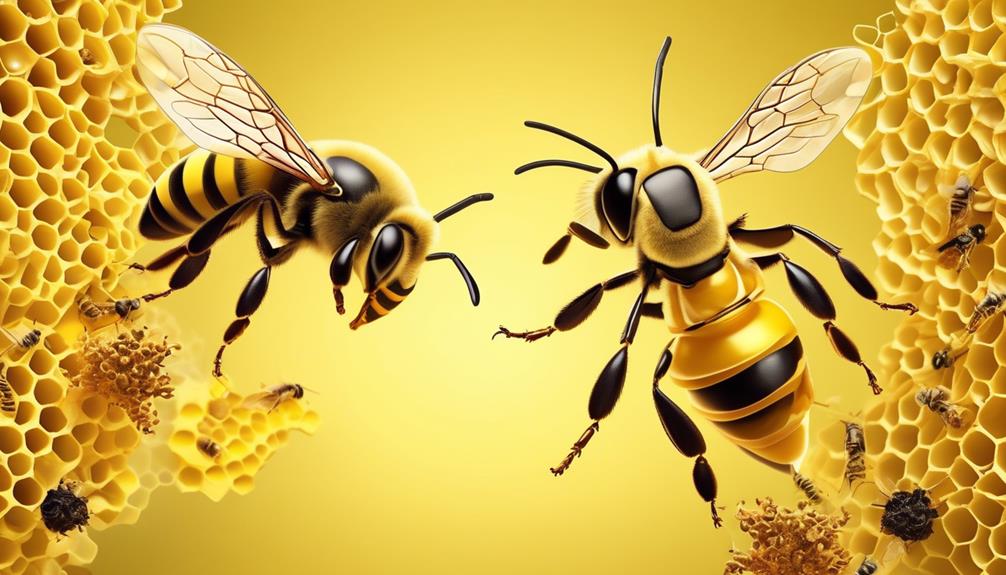
In understanding allergic reactions, it's crucial to note that individual responses to allergens, such as wasp or bee venom, can vary widely due to factors like genetic predisposition, previous exposure, and the immune system's unique sensitivities.
Your genetic makeup could make you more susceptible to wasp allergies, while remaining unresponsive to bee stings. These factors also contribute to the severity of an allergic reaction.
Previous exposure to the venom, too, plays a critical role. It's not uncommon for your first sting to go unnoticed while a subsequent sting triggers a severe reaction. Your immune system, in its first encounter with the venom, can develop antibodies against it, leading to an allergic reaction upon re-exposure.
Individual variations in immune system sensitivities also affect allergic reactions. Your immune system may overreact to the venom, releasing chemicals that cause allergic symptoms. Another person's immune system, however, mightn't perceive the venom as a threat, resulting in no allergic reaction.
Understanding these individual variations can help in managing allergies and developing personalized treatment strategies. It's always essential to consult with an allergist if you suspect an allergy to wasp or bee stings.
Frequently Asked Questions
Can Allergies to Wasps Develop Later in Life Even if I Wasn't Allergic as a Child?
Yes, you can develop an allergy to wasps later in life even if you weren't allergic as a child. The immune system can change over time, reacting differently to wasp venom. This reaction can initiate an allergic response.
You might've been stung before without incident, but that doesn't mean you're immune forever. It's always crucial to monitor your body's reactions, as allergies can emerge unexpectedly, even to things you've encountered before.
Are There Any Specific Treatments or Medications Available for Wasp Allergies?
Yes, there are specific treatments available for wasp allergies.
You can get allergy shots, also known as immunotherapy, to decrease your sensitivity to wasp venom.
Epinephrine auto-injectors are often prescribed too. They're used to treat severe allergic reactions, like anaphylaxis.
Antihistamines and corticosteroids can help relieve milder symptoms.
Always consult with your healthcare provider for an appropriate treatment plan.
Is It Possible to Be Allergic to Wasps but Not Bees Due to Dietary Habits or Environmental Factors?
You're allergic to wasps but not bees because allergies aren't determined by diet or environment. It's your immune system's response to specific proteins.
Bees and wasps have different proteins in their venom. So, you've reacted to wasp venom proteins but not bee venom proteins.
It's not about where you live or what you eat. It's how your body uniquely responds to these specific venoms.
That's why you're allergic to one and not the other.
Can a Wasp Sting Trigger Other Allergies?
Yes, a wasp sting can trigger other allergies. When you're stung, your body releases histamines to fight off the venom. This can cause an allergic reaction elsewhere in your body, not just at the sting site. It's like your immune system overreacts.
Symptoms might include hives, swelling, or difficulty breathing. If you've had a serious reaction before, it's best to carry an epinephrine autoinjector with you.
How Can I Reduce My Chances of Getting Stung by a Wasp if I Am Allergic?
Reducing your chances of a wasp sting involves some simple steps.
First, avoid wearing bright colors or floral patterns, as they attract wasps.
Don't wear sweet perfumes or lotions either, as these can also attract them.
If you're eating outside, cover your food and drinks to prevent wasps from being drawn to sugary substances.
Never swat at a wasp, as it will only make it more aggressive. Instead, stay calm and slowly move away.
It's also a good idea to keep windows and doors shut to prevent them from entering your home.
Conclusion
So, you're allergic to wasps but not bees. It's all down to your immune system's unique response and the biological differences between these insects.
Wasp venom has different components than bee venom, triggering different reactions. Remember, everyone's allergic responses vary.
It's this biological cocktail of insect venom, your immune system, and individual variations that lead to your specific allergies. Understanding this complexity is key to managing and potentially treating your allergic reactions.

